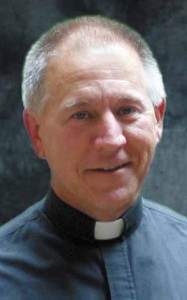By Fr. Bud Grant

Should we feed the poor? This is, of course, a rhetorical question. Nothing is more central to the Gospel than that simple mandate. But it does expose a real problem: feeding the poor, if done badly, can keep people poor, increase their dependency on the wealthy and erode our inter-human relationships. It can devolve into a real world “hunger game” in which the powerful manipulate aid in order to help the poor just enough to keep them consuming our goods, but not independent enough to become competitors for markets. Food can be withheld as punishment or doled out as reward in order to retain a sort of queasy economic and political equilibrium that keeps power where it is.
It is this very disturbing manipulation of hunger that lies behind a unique presentation to be given here at St. Ambrose University on Dec. 1 as part of our “Sustain-ability” series. Two speakers will unpack the moral complexity of aiding the hungry, as both a humanitarian and an environmental challenge, fraught with geo-political and social justice overtones.
We are all aware of the food crisis: 14 percent of those living in developing countries are malnourished; half of childhood deaths are caused by hunger; in America 17 million kids are “food-insecure;” the richest 1 percent possess 40 percent of all income in America. Global population is headed toward 9 billion while efforts to ramp up productivity destroy wild fish populations, cause heavier reliance on GMO grains and extend agriculture into fragile systems. Yeah, we get it. What can we do about it? Our speakers show us even while exposing those deep layers of complexity.
Matt Ehlman, former vice president for development at Red Cloud Indian School on Pine Ridge Reservation, S.D., now works to bring philanthropists together with causes. One of his clients is “Feeding South Dakota,” whose goal is to halve the hunger in that state (South Dakota has eight of the nation’s 30 poorest counties). When he heard the title of the event, “Shall We Feed the Hungry,” Matt said: “just come out here and see.” Based on his Ph.D. research he argues that philanthropy is the collaborative link between people with expressed needs and those who have the means to help. That recipients retain their dignity and control of their own decisions is crucial.
Troy Johnson, a Fulbright Scholar, has worked in international development for a number of years in such places as Kazakhstan, Indonesia and Liberia. He is now with “World Learning” as a senior program officer for Pakistan. He points out that U.S. foreign aid is an essential, but inadequate, means of helping those in the developing world. We are trying, he says, “to steer a very large vehicle (globalization) with a very tiny steering wheel (foreign aid).” He adds that non-military aid from the U.S. is “dwarfed” by “private sector or off-market trade” and even by remittances (money sent home by immigrants working abroad). Further, because foreign aid is inextricably linked to our international political agenda, it isn’t necessarily aid to those who need it the most, but strategic “targeted help for a few.”
The point that both of these good men make, I think, is that feeding the poor doesn’t mean simply shifting wealth. Internationally, it is an extension of State Department diplomacy, caught up in achieving some sort of geo-political stability. The aid that is being rushed to the Philippines, for example, will not just alleviate immediate suffering; it will be designed to fundamentally adapt the islands’ infrastructure — including agriculture and even the natural environment — so that the next crisis may be less violent. In the realm of private philanthropy, feeding the poor means cultivating relationships — an active engagement among people so that everyone benefits. Christian philanthropists recognize Christ in the act of sharing…. “for I was hungry and you gave me food, I was thirsty and you gave me drink, I was a stranger and you welcomed me,” says our Lord (Mt. 25:35).
(Father Bud Grant is a professor of theology at St. Ambrose University in Davenport.)







